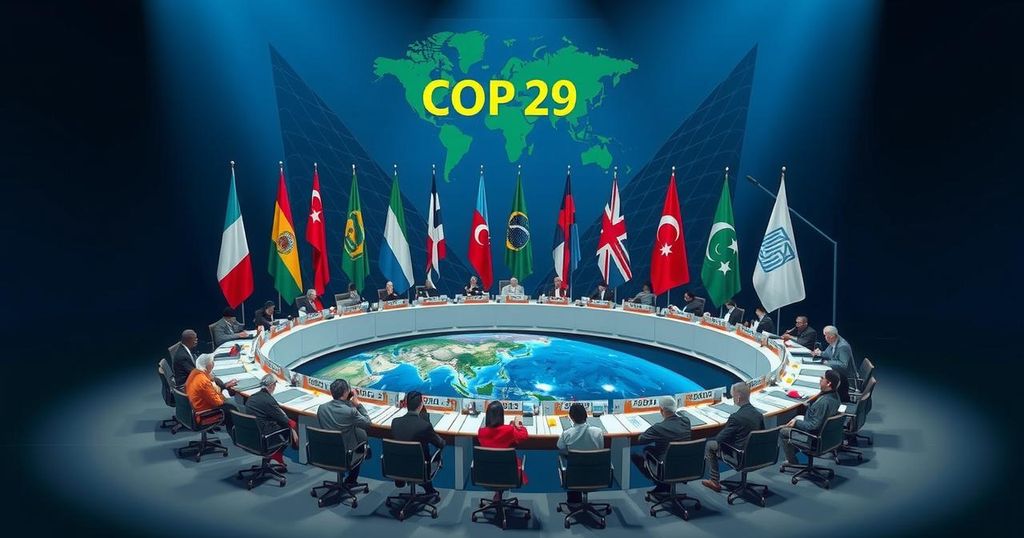The COP29 climate conference in Baku, Azerbaijan opened with pressing demands from developing nations for wealthy countries to commit trillions in climate financing. Key discussions include establishing a new global climate finance target, while the intersection of climate change and public health is highlighted by experts. However, disagreements persist regarding financing sources, and criticism regarding the leadership’s ties to fossil fuel expansion raises credibility concerns. The outcomes of COP29 hold significant implications for future climate action.
As the COP29 climate conference commenced in Baku, Azerbaijan, attention turned to the urgent demands of developing nations for wealthier countries to mobilize trillions in climate financing. Following a notable impasse at the recent UN biodiversity summit, talks at COP29 focus on establishing a new global climate finance target to replace the unmet $100 billion annual pledge that was supposed to be honored since 2009. The discussions around the New Collective Quantified Goal carry significant weight, leading to the designation of Baku as the “finance COP.” The convening leaders emphasized the dire necessity of immediate action to prevent catastrophic temperature rises by citing alarming reports from the UN Environment Programme. COP29 President Mukhtar Babayev urged delegates to recognize the pressing reality that without urgent commitments, humanity faces dire consequences: “We are on the road to ruin.” The Baku summit serves as a pivotal moment for aligning nations on financing strategies that can address the increasingly severe impacts of climate change. Health experts voiced that climate actions must integrate health considerations alongside traditional financing pillars. The World Health Organization (WHO) identified that climate change and air pollution are responsible for an estimated seven million premature deaths annually, underscoring the critical intersection of health and climate issues that requires attention and funding. Jess Beagley, the Global Climate and Health Alliance policy lead, asserted that a strong financial commitment is vital for combatting health risks posed by climate change, primarily in vulnerable populations. Despite pressure on developed countries to contribute, disagreements on financing sources remain prevalent. While developing nations advocate for direct public funding, wealthier nations contend that private financing mechanisms should lead. Moreover, as the summit unfolded, leaders from several major economies remained absent, raising questions about the seriousness of commitments towards climate action. The COP29 convention also faced scrutiny regarding its leadership, considering Azerbaijan’s petroleum legacy and past controversies surrounding fossil fuel dealings. Concerns were amplified by evidence linking the current leadership and host nation to oil and gas expansion plans, thus compromising the conference’s credibility. In summary, the convening of COP29 amidst pressing climate realities illuminates the formidable challenges ahead, particularly in rallying financial support and capitulating to environmental imperatives in the face of significant resistance. As negotiations progress, the urgency for collective action remains at the forefront, reinforced by the dire warnings of health impacts stemming from climate inaction.
The United Nations climate conference, COP29, is being held in Azerbaijan, where discussions center around the urgent need for significant climate financing. Developing nations seek financial commitments from wealthier countries, emphasizing the link between climate change and public health concerns. The conference is perceived as vital in establishing a new global framework for climate finance to address rising temperatures and the consequential health risks associated with climate-related disasters. As the global community grapples with recent climate emergencies, the stakes at COP29 represent a turning point for coordinated international action against climate change.
The COP29 climate negotiations, marked by the call for trillions in climate finance from wealthy nations, underscore the crucial intersection of environmental policies and public health impacts. Addressing the mounting pressures of climate change is imperative not only for environmental sustainability but also for ensuring global health security. The outcomes from Baku will thus fundamentally shape future climate action, finance mechanisms, and the resilience of vulnerable populations facing the adverse consequences of climate-induced changes.
Original Source: healthpolicy-watch.news






